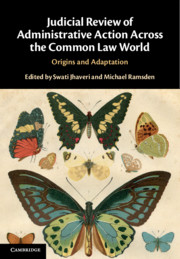Book contents
- Judicial Review of Administrative Action across the Common Law World
- Judicial Review of Administrative Action across the Common Law World
- Copyright page
- Contents
- Contributors
- Foreword
- Acknowledgments
- Table of Cases
- Table of Legislation
- Abbreviations
- Part I Introduction
- Part II Origins and Adaptations of Judicial Review in England
- Part III Origins and Adaptations in the British Isles
- Part IV Origins and Adaptations in North America and Canada
- Part V Origins and Adaptations in the Middle East and Africa
- Part VI Origins and Adaptations in Asia
- 12 The Evolution of Administrative Law in Singapore
- 13 Indigenous Interactions
- 14 English Administrative Law in Post-Handover Hong Kong
- 15 Deconstitutionalising and Localising Administrative Law in India
- 16 Decolonizing Administrative Action
- Part VII Origins and Adaptations in Australasia
- Part VIII Conclusion: Interrogating “Common Law” Approaches to Judicial Review
- Index
15 - Deconstitutionalising and Localising Administrative Law in India
from Part VI - Origins and Adaptations in Asia
Published online by Cambridge University Press: 19 March 2021
- Judicial Review of Administrative Action across the Common Law World
- Judicial Review of Administrative Action across the Common Law World
- Copyright page
- Contents
- Contributors
- Foreword
- Acknowledgments
- Table of Cases
- Table of Legislation
- Abbreviations
- Part I Introduction
- Part II Origins and Adaptations of Judicial Review in England
- Part III Origins and Adaptations in the British Isles
- Part IV Origins and Adaptations in North America and Canada
- Part V Origins and Adaptations in the Middle East and Africa
- Part VI Origins and Adaptations in Asia
- 12 The Evolution of Administrative Law in Singapore
- 13 Indigenous Interactions
- 14 English Administrative Law in Post-Handover Hong Kong
- 15 Deconstitutionalising and Localising Administrative Law in India
- 16 Decolonizing Administrative Action
- Part VII Origins and Adaptations in Australasia
- Part VIII Conclusion: Interrogating “Common Law” Approaches to Judicial Review
- Index
Summary
The chapter starts with an evaluation of the role of the Constitution in the development of an autochthonous approach to judicial review of administrative action in India. Article 14 of the Constitution guarantees citizens a ‘Fundamental Right’ to equality before law and equal protection of the law in. This has been interpreted to include protection from arbitrary state action. Therefore, anyone wanting to challenge administrative action in India can do so by challenging the ‘arbitrariness’ of a decision under Article 14 by way of writ petition to the High Court or Supreme Court. The chapter criticises the dominance of the ‘arbitrariness doctrine’ and the eclipse of grounds of judicial review available at common law. It will demonstrate that in many cases, the Supreme Court has offered little guidance on how to test for arbitrariness. In addition, the use of the writ petition to invoke the constitutional jurisdiction of the courts has led to serious problems for access to justice. Taking for granted that rolling back the doctrine would require massive constitutional change – both unlikely, and disruptive – the chapter makes two arguments for legal reform. The Supreme Court should use traditional common law grounds as a guide to when administrative action is arbitrary. The Supreme Court should also, it argues, emphasise the independent status of common law grounds, in order to promote access to justice: lower courts should decide administrative law claims on common law grounds, easing the burden on the over-stretched writ petition jurisdiction. There is precedent that supports both these moves, and there is reason to hope they mitigate the problems raised by the arbitrariness doctrine, with the added advantage of broadening the public law toolkit of courts and counsel.
- Type
- Chapter
- Information
- Judicial Review of Administrative Action Across the Common Law WorldOrigins and Adaptation, pp. 273 - 288Publisher: Cambridge University PressPrint publication year: 2021

